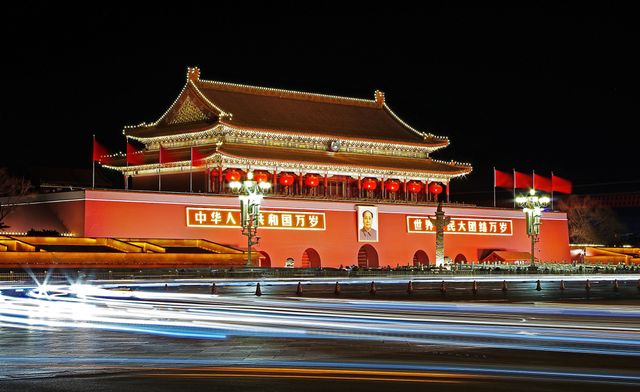11.5.3
Challenges to National Identities
Challenges to National Identity - TNCs
Challenges to National Identity - TNCs
In a more globalised world, there are threats and challenges to national sovereignty. Foreign companies and TNCs are one example of this.


FDI and other investment
FDI and other investment
- Flows of investment by foreign governments, manufacturing and media companies and wealthy individuals have bought or taken over many assets in the UK.
- Norges, the Norwegian Sovereign Wealth Fund, bought 25% of the leasehold on the landmark office building, 30 Warwick Street.
- A Qatari-led group purchased the Canary Wharf complex in London in 2015.


Foreign takeovers
Foreign takeovers
- International companies may takeover (acquire) British companies.
- The shareholder acceptance level for a foreign takeover in the UK is only 50% - other countries have higher threshold levels. In the USA, a department called CFIUS bans many takeovers on the grounds of national security (such as the proposed takeover of Qualcomm by Broadcom).


International investors
International investors
- Several TNCs in the UK have been bought by Chinese and Indian investors.
- Jaguar Land Rover (JLR) is owned by the Indian company Tata Motors.
- Some people argue these takeovers can threaten a national identity. What does 'Made in Britain' mean in the global age?


Employment
Employment
- Sometimes takeovers by international companies can lead to significant job losses.
- Kraft completed a takeover of Cadbury in 2009. It promised to keep plants and factories open but shut many down within a few years.
Challenges to National Identity - Westernisation
Challenges to National Identity - Westernisation
Westernisation is the promotion of European and North American cultural values. It can be a soft challenge to national identity through a number of factors:


Global retail
Global retail
- TNCs like Apple and Inditex (Zara) sell smartphones and clothes internationally.
- People in almost all countries in the world can wear the same clothes and use the same software and hardware.


Food
Food
- McDonald's has 34,480 restaurants in 119 different countries in the world.
- Although low-cost food that people enjoy eating may show the benefits of capitalism, the spread of obesity (30-35% of Americans are obese), may not be a positive trend.
- However, TNCs often adapt to the local culture. McDonald's in India serves Paneer Burgers.


Media
Media
- Disney's films like Toy Story and Monsters Inc are watched internationally.
- However, TNCs increasingly gain new ideas from local cultures, rather than attempting to supplant them. Disney released 'Arjun: The Warrior Prince' in India in 2012.
- Changing the nature of products to meet local tastes, demand or laws is called 'glocalisation'.
Challenges to National Identity - Property Markets
Challenges to National Identity - Property Markets
The ownership of property, land and businesses is increasingly becoming non-national, and this can be seen as a threat to national identity.


Foreign buyers
Foreign buyers
- In many parts of London (including St John's Wood, Knightsbridge and South Kensington), foreign buyers own a high percentage of the residential property.
- French & Greek residents are particularly concentrated in South Kensington.
- Similarly, many English retirees own property in the South of Spain.
- This can impact the national identity and also create resentment towards migrants if this demand increases house prices and makes them unaffordable for locals.
- For example, in 2013 the Financial Times reported that 82% of property deals in Central London involve foreign buyers.


Bans on property purchases
Bans on property purchases
- In 2018, New Zealand introduced a ban on the purchase of residential property by foreigners. This excluded foreigners from Australia and Singapore because of trade pacts that already existed.
- Silicon Valley billionaires like Peter Thiel had purchases 400+ acre farms in New Zealand. Many think it is a doomsday backup plan to escape to New Zealand if there is a breakdown of society in the USA.
1Tectonic Processes & Hazards
1.1Tectonic Processes & Hazards
1.2Natural Disasters
1.3Natural Disaster Case Studies
1.4Trends & Patterns
2Option 2A: Glaciated Landscapes & Change
2.1Glaciated Landscapes Over Time
2.2Periglacial Landscapes
2.3Glacial Processes
2.4Glacial Landforms
3Option 2B: Coastal Landscapes & Change
3.1Coastal Landscapes
3.2Coastal Erosion & Deposition
3.3Coastal Risks
4Globalisation
4.1Globalisation
4.2Negatives of Globalisation
4.3Global Shift
4.5Culture
4.6Measuring Development
5Option 4A: Regenerating Places
5.1Types of Economies
5.2Function of Places
5.3Regeneration
5.4Regeneration Case Studies
6Option 4B: Diverse Places
6.1Population Structure
6.2Past & Present Connections
6.3Urban & Rural Spaces
6.4Diversity
6.5Urban & Rural Case Studies
6.6Case Study - Tower Hamlets
6.7Case Study - Sturton-le-Steeple
7The Water Cycle & Water Insecurity (A2 only)
7.1Hydrological Processes Global to Local
7.2Influences on the Water Cycle
7.3Water Insecurity
8The Carbon Cycle & Energy Security (A2 only)
8.1The Carbon Cycle
8.2Energy Consumption
8.3Alternative Energy
8.4Growing Demand for Resources
9Superpowers (A2 only)
9.1Superpowers
9.2Hard & Soft Power
9.2.1Hard & Soft Power
9.2.2Emerging Powers - China Rivalry
9.2.3Emerging Powers - Chinese Sources of Power
9.2.4Emerging Powers - Brazil
9.2.5Emerging Powers - Russia
9.2.6Emerging Powers - India
9.2.7Theories of Development
9.2.8Power Case Studies: Chinese One Belt One Road
9.2.9Power Case Studies: Pakistan Nuclear Arms
9.2.10Power Case Studies: OPEC
9.3IGOs, TNCs & Alliances
10Option 8A: Health & Human Rights (A2 only)
10.1Human Development
10.2Role of Governments & IGOs
10.3Human Rights
10.4Interventions
11Option 8B: Migration & Identity (A2 only)
11.1Globalisation & Migration
11.2Consequences of Migration
11.3Nation States
11.4Responses to Global Migration
Jump to other topics
1Tectonic Processes & Hazards
1.1Tectonic Processes & Hazards
1.2Natural Disasters
1.3Natural Disaster Case Studies
1.4Trends & Patterns
2Option 2A: Glaciated Landscapes & Change
2.1Glaciated Landscapes Over Time
2.2Periglacial Landscapes
2.3Glacial Processes
2.4Glacial Landforms
3Option 2B: Coastal Landscapes & Change
3.1Coastal Landscapes
3.2Coastal Erosion & Deposition
3.3Coastal Risks
4Globalisation
4.1Globalisation
4.2Negatives of Globalisation
4.3Global Shift
4.5Culture
4.6Measuring Development
5Option 4A: Regenerating Places
5.1Types of Economies
5.2Function of Places
5.3Regeneration
5.4Regeneration Case Studies
6Option 4B: Diverse Places
6.1Population Structure
6.2Past & Present Connections
6.3Urban & Rural Spaces
6.4Diversity
6.5Urban & Rural Case Studies
6.6Case Study - Tower Hamlets
6.7Case Study - Sturton-le-Steeple
7The Water Cycle & Water Insecurity (A2 only)
7.1Hydrological Processes Global to Local
7.2Influences on the Water Cycle
7.3Water Insecurity
8The Carbon Cycle & Energy Security (A2 only)
8.1The Carbon Cycle
8.2Energy Consumption
8.3Alternative Energy
8.4Growing Demand for Resources
9Superpowers (A2 only)
9.1Superpowers
9.2Hard & Soft Power
9.2.1Hard & Soft Power
9.2.2Emerging Powers - China Rivalry
9.2.3Emerging Powers - Chinese Sources of Power
9.2.4Emerging Powers - Brazil
9.2.5Emerging Powers - Russia
9.2.6Emerging Powers - India
9.2.7Theories of Development
9.2.8Power Case Studies: Chinese One Belt One Road
9.2.9Power Case Studies: Pakistan Nuclear Arms
9.2.10Power Case Studies: OPEC
9.3IGOs, TNCs & Alliances
10Option 8A: Health & Human Rights (A2 only)
10.1Human Development
10.2Role of Governments & IGOs
10.3Human Rights
10.4Interventions
11Option 8B: Migration & Identity (A2 only)
11.1Globalisation & Migration
11.2Consequences of Migration
11.3Nation States
11.4Responses to Global Migration
Unlock your full potential with Seneca Premium
Unlimited access to 10,000+ open-ended exam questions
Mini-mock exams based on your study history
Unlock 800+ premium courses & e-books